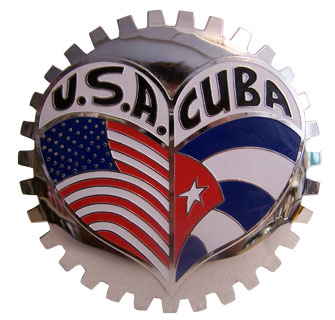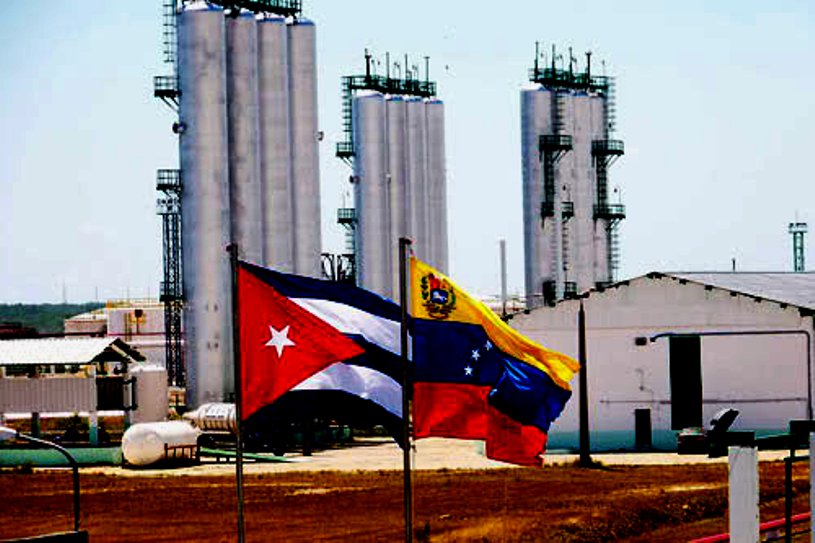Smoking the Cigar of Peace: The Far-Reaching Consequences of the Cuban-American Thaw
 It’s hard to imagine a place more hauntingly beautiful than Cuba, a Caribbean jewel that seems to be permanently stuck in the last century and whose slow decay only adds flavour to its rich cultural aroma. A week ago, just as many countries were experiencing a sudden drop in temperatures, that flavourful, warm tropical breeze seemed to have found its way into the Oval office, signalling the long-awaited thaw in the hitherto frigid relations between the US and Cuba. But who will benefit and who may lose out on the possible lifting of the half-a-century-old embargo that had halted trade and travel between this tiny communist state and its massive capitalist neighbour?
It’s hard to imagine a place more hauntingly beautiful than Cuba, a Caribbean jewel that seems to be permanently stuck in the last century and whose slow decay only adds flavour to its rich cultural aroma. A week ago, just as many countries were experiencing a sudden drop in temperatures, that flavourful, warm tropical breeze seemed to have found its way into the Oval office, signalling the long-awaited thaw in the hitherto frigid relations between the US and Cuba. But who will benefit and who may lose out on the possible lifting of the half-a-century-old embargo that had halted trade and travel between this tiny communist state and its massive capitalist neighbour?
According to the agreement brokered over the course of seven hush-hush meetings in Canada and mediated in part by Pope Francis, the two sides will exchange political prisoners. But more than that simple agreement, the US president has touted this as a first step in normalizing the relations between the US and Cuba, heralding a thaw in what is widely regarded as one of the last Cold War relics in the world. The embargo went in effect back in the 1960s, after some drastic privatization and nationalization measures had been introduced by the Fidel Castro’s communist regime.

The tit-for-tat sanctions — not dissimilar to the ones being now exchanged between the EU and Russia — began when US oil companies had refused to process Soviet oil. Cuba then had retaliated by taking over all oil companies, and the US had replied by stopping imports of Cuban sugar. The final straw that broke diplomatic relations between the two countries was the complete nationalization of all American-owned property located on Cuban soil.
As a result of that illegal move, many offshore American companies and individuals lost their homes and possessions. Overnight, the communist rule stripped landowners of their land, factory workers of their places to work, and the American-Cuban families of their rich mixed-culture heritage. More than 6000 properties worth an estimated USD 7 bln were reportedly seized back then, and these assets are unlikely to be ever returned.
However, with the thaw on the horizon, experts believe that other, lucrative opportunities await flexible investors who had lost something to the original nationalization effort. Robert L. Muse, one of the lawyers protecting the interests of the claimants in this case, says it’s not about the numbers anymore, but rather about future possibility of investment. „I think a large flare has gone up over the corporate claimants. They are not going to miss it. (…) If people approach it with the right flexibility, innovation is going to be key,” he adds.

That flexibility will first and foremost mean that instead of recouping the 50-year-old losses, the companies will perhaps have an easier time investing into the stagnant economy, though as of yet, Raul Castro has not budged in terms of freeing the state-run marketplace. Even so, with a total GDP of just USD 68 bln., any monetary compensation from Cuba would simply be physically impossible. But as it happens, recovering what’s been lost fifty years ago is not the biggest draw that the US will experience as a result of the thaw.

„The response in our office has been overwhelming. We’re flooded. We’ve never seen anything like it,” exclaims Tom Popper, president of Insight Cuba, a company that has legally taken around 10 000 Americans to Cuba since the year 2000. „I think it portends to an incredible future with regards to travel and opportunities for Americans to see a place that’s been prohibited for 51 years,” he adds.
There’s definitely a booming interest in Cuba as a cheap vacation spot right around the corner from the senior (and alligator) riddled Florida. It’s a destination that is both exotic and cheap, and one that brings nostalgia, music, rum, cigars and old American cars together in an unforgettable, exceedingly warm way. Cuban Americans, the descendants or relatives of Cuban nationals, can come and go as they please, but at around 500 000 people a year they are still a minority among the 3-million-strong tourist force that visits Cuban beaches annually. If Americans were allowed to go to Cuba more freely, that number, experts claim, would skyrocket in a matter of months.

Right now, however, visiting Cuba is still out of John Q. Public’s reach in the US. The 1960s embargo effectively blocked tourist traffic between the two nations. In the US, it means that any citizen that wants to travel to Cuba has to do so purposefully. This means that it can only happen for 12 very precisely stated reasons, like journalism, sports, research, cultural or religious activities. That short list was compiled back in 1996 by Congress to outline when and how the Americans are allowed to go to Cuba.
But even the lucky few that fit the bill aren’t going on R&R cruises. It’s not even leisure in the strictest sense of the word and it costs an arm and a leg because of a lot of rules and forms to be filed with the government, as well as various expenses whose only purpose is to deter anyone not really serious about visiting Cuba. A typical tour will set you back around USD 5000-6000 and — if you’re an American citizen — require a ton of paperwork to prove that you are, indeed, coming to educate yourself or experience the unique culture of Cuba, and not just to have fun.

It can be hosted by only a few government-approved Cuban nationals that are allowed to show American citizens around Havana. While there, you’ll be taking fixed routes to very specific events or locations, where visitors are graciously allowed to explore the crumbling post-colonial architecture, listen to Cuban music or walk down the sun-bleached streets of „that place where they make the best cigars”. And even with all the positive changes now taking place, you still won’t be allowed to take cigars or rum back to the US above a certain (very small) limit.
Bob Guild with Marazul Charters, a Floridian travel agency specializing in Cuban tours, says that it may take them a year to accommodate all the Americans that want to go on tours now that the reclusive island state is slightly more open to them. The new system will allow Americans to go on an „honour system„, but some rules will still apply. „As long as with integrity they can say they’re going to engage with the Cuban people and learn about Cuba and talk about the United States then they don’t have to do anything other than say that’s what they’re doing,” says John McAuliff at the Fund for Reconciliation and Development, an organization that hosted Cuban tours in the past. It may very well be that a year from now, Americans will travel to Cuba in a truly American fashion, spending days in the sun drinking or doing pretty much nothing, just relaxing by the Caribbean.

But with an imminent influx of American travellers, what will happen to the other nations in the region?
It’s entirely possible that reopening USA-Cuba relations will adversely affect all the countries that have benefitted from the embargo in one way or another.  For example, Canada has been on pretty friendly terms with Castros’ Cuba for around sixty years now. Of three million tourists annually, half a million are Canadians that come to Cuba to relax — a welcome and cheap holiday for someone living near the Arctic Circle, for certain. Unlike their US counterparts, Canadians can come on purposeless visits, just to have some fun in the sun. That friendliness and openness in relations is what made it possible for Canada to serve as a sort of economic bridge for cigar exports between the US and Cuba, circumventing the embargo by becoming a middleman of sorts.
For example, Canada has been on pretty friendly terms with Castros’ Cuba for around sixty years now. Of three million tourists annually, half a million are Canadians that come to Cuba to relax — a welcome and cheap holiday for someone living near the Arctic Circle, for certain. Unlike their US counterparts, Canadians can come on purposeless visits, just to have some fun in the sun. That friendliness and openness in relations is what made it possible for Canada to serve as a sort of economic bridge for cigar exports between the US and Cuba, circumventing the embargo by becoming a middleman of sorts.
That trade now accounts for a massive USD 1 bln per year, of which cigars are a pretty hefty part. Could this signal the advent of cheaper, domestic imports of cigars, bypassing Canada altogether, if embargo were lifted or loosened? And if so, how big of a hit will the Canadian economy have to endure? It’s still too early to tell, but other countries, too, may be feeling the negative after-effects of the American-Cuban thaw, and much sooner than the Great White North.

One such country is Venezuela — a nation that has been supplying Cuba with cheap oil for many years. Recently, because of the plummeting global oil prices, Venezuela has been in dire economic straits. The situation was already strenuous, but then, just a day after announcing the normalization of the Cuban-American relations, Obama publicly imposed harsh sanctions on this struggling South American state. The US will now freeze assets and deny visas to some of the officials that had reportedly violated human rights in Venezuela, a move that will not make Obama any friends in Caracas for sure.
David Smilde, a senior fellow at the Washington Office on Latin America says that the timing of the two moves is far from coincidental. „I think those things clearly are related,” he claims, adding „[the relationship with Cuba] makes it a little bit more difficult for the Maduro government to argue that the Obama government is imperialist and controlling its backyard.” Nevertheless, Smilde is certain that the sanctions are not aimed at Venezuela per se, but rather something that „gives Obama cover about being soft on dictators” in Congress.

The move may also signal a profound change of tack in Fidel Castro’s brother’s regime. “Clearly, Raúl Castro is diversifying his assets and his options,” says Christopher Sabatini, a director at Americas Society and Council of the Americas about the two announcements. “It totally marginalizes Maduro and his government,” he claims. Though Castro still maintains that his communist credentials are as fresh now as when his brother and Che Guevara took over the country all those years ago, some signs point to a possibility of future relaxation of the regime, however slight it may be.

But Venezuela isn’t the only nation that may end up losing political and economical clout in the region if the US trade embargo is lifted. Brazil, for example, had invested more than USD 800 mln in Cuba, creating a free-trade zone in Mariel and building a container port which opened last year. Their economic interests will likely suffer in the long run if Cuba starts looking north for its exports and imports. „It basically challenges Brazil’s role [in Cuba] in many ways,” says Sabatini. And though Mexican president Enrique Peña Nieto congratulated Castro on his agreement in a private conversation, many Mexican tour operators are worried that opening Cuba as a destination will hit Mexico hard. After all, millions of Americans come every year to Cancun, but if pristine Cuban beaches become available, they may well opt for the Caribbean jewel as a cleaner and cheaper alternative.

But beaches, oil and cigars aside, it’s undeniably good for Cuba to become less repressed and closed off to the world. And who knows, perhaps simply losing one of the few remaining Cold War relics is worth something more than falling tobacco prices, oil exports or embargo-driven trade?

hauntingly – zniewalająco
jewel – klejnot
permanently – na stale, wiecznie
century – wiek
decay – rozkład
flavour – smak (UK)
aroma – aromat
sudden – nagły
breeze – bryza
Oval office – gabinet owalny
thaw – odwilż
hitherto – dotychczas, jak dotąd
frigid – oziębły
to benefit – skorzystać
to lose out on sth – stracić na czymś/przez coś
to lift – unieść
to halt – wstrzymać
tiny – maleńki
state – państwo
neighbour – sąsiad (UK)
according to sth – zgodnie z czymś
to broker sth – wynegocjować coś
hush-hush – potajemny
to mediate sth – pośredniczyć w czymś
pope – papież
to exchange – wymienić (się)
to tout sth as sth – okrzyczeć coś jakimś mianem
to normalize – unormować
to herald sth – zwiastować coś, zapowiadać
regarded as sth – uznawany za coś/jakiegoś
relic – pozostałość, relikt
to go in effect – wejść w życie
measure – środek, krok
to introduce – wprowadzić
regime – reżim
tit-for-tat – odwetowy
dissimilar – niepodobny
to refuse – odmówić
to process – przetworzyć
oil – ropa naftowa
to retaliate – odpowiedzieć (czymś), brać odwet
to take over – przejąć
to reply – odpowiedzieć
final straw – ostatnia kropla
nationalization – nacjonalizacja, upaństwowienie
property – własność, mienie
soil – gleba, ziemia
illegal – nielegalny
offshore – zagraniczny
individual – jednostka, osoba
possessions – majątek, dobytek
overnight – w ciągu jednej nocy, z dnia na dzień
rule – rządy
to strip sb of sth – pozbawić kogoś czegoś
landowner – posiadacz ziemski
factory – fabryka
heritage – dziedzictwo
reportedly – rzekomo
to seize sth – przejąć coś, zająć (nieruchomość, mienie)
estimated – szacowany, podawany w przybliżeniu
assets – majątek, aktywa
horizon – horyzont
lucrative – lukratywny
flexible – elastyczny
to protect sth – ochronić coś, tu: reprezentować (kogoś w sądzie), dbać (o czyjeś dobro)
claimant – ubiegający się, petent
flare – flara, raca
to miss sth – przeoczyć coś
to approach sth – podejść do czegoś (w jakiś sposób)
first and foremost – przede wszystkim
to recoup sth – odzyskać coś (straty), nadrobić
losses – straty
stagnant – w zastoju
to budge – ustąpić, dać się przekonać
in terms of sth – pod jakimś względem, odnośnie (do) czegoś
state-run – państwowy, pod kontrolą państwa
GDP (gross domestic product) – PKB (produkt krajowy brutto)
monetary – finansowy, pieniężny
compensation – odszkodowanie, rekompensata
as it happens – tak się składa, że…
draw – atrakcja, coś, co przyciąga
to experience sth – doświadczyć czegoś
response – odpowiedź, tu: zainteresowanie
overwhelming – przytłaczający, olbrzymi
to flood – zalać, zatopić
to exclaim – zawołać, wykrzyknąć
to portend to sth – zwiastować coś
with regards to sth – odnośnie (do) czegoś, co się tyczy czegoś
to prohibit – zakazać
booming – przeżywający boom
vacation spot – miejsce do spędzenia wakacji
X-riddled – pełen X, przepełniony X
destination – cel podróży
unforgettable – niezapomniany
exceedingly – ogromnie, niezwykle
descendant – potomek
relative – krewny
X national – mieszkaniec X, rdzenny X
minority – mniejszość
X-strong sth – coś, w czym bierze udział/znajduje się/na co się składa X ludzi (o dużej liczbie)
force – tu: grupa, siły
annually – rocznie
to claim – twierdzić
to skyrocket – gwatłownie wzrosnąć
John Q. Public – przeciętny Kowalski (US)
traffic – ruch
citizen – obywatel
stated – opisany, wyznaczony
journalism – dziennikarstwo
research – badanie, badania
to compile – zebrać, ułożyć
to outline – wyznaczyć, określić
to fit the bill – nadawać się, pasować
R&R (rest and relaxation) cruise – rejs łodzią/statkiem w celu relaksu i odpoczynku
leisure – wypoczynek
in the strictest sense of the word – w najlepszym tego słowa znaczeniu
to cost an arm and a leg – kosztować krocie
form – formularz
to file – wystosować, złożyć (podanie)
expenses – koszty
purpose – cel
to deter sb – odstraszyć kogoś, zniechęcić
tour – wycieczka
to set sb back X – kosztować kogoś X
paperwork – papierkowa robota
unique – unikalny
to host – być gospodarzem, organizować
government-approved – zaaprobowany przez państwo
fixed – ustalony
route – droga, trasa
event – wydarzenie
graciously – łaskawie
crumbling – rozpadający sie, murszejący
sun-bleached – wybielony przez słońce
Floridian – z Florydy
to specialize in sth – specjalizować się w czymś
to accommodate sb – wypełnić czyjeś prośby/potrzeby
reclusive – samotniczy, tu: odosobniony
honour system – wierzenie komuś na słowo, zawierzanie komuś (że nie zrobi czegoś złego, gdyż obiecał tego nie robić)
to apply – mieć zastosowanie
integrity – uczciwość, prawość
to engage with sb – wejść z kimś w interakcje, obcować z kimś
reconciliation – ugoda, pogodzenie się
imminent – niechybny, zbliżający się
influx – napływ
adversely – negatywnie
to affect sth – wpłynąć na coś, dotknać coś
to be on friendly terms with sb – być z kimś w przyjaznych stosunkach
welcome – mile widziany, pożądany
the Arctic Circle – koło podbiegunowe
counterpart – odpowiednik
purposeless – bezcelowy, nie mający celu
to serve as sb – posłużyć jako ktoś, odegrać jakąś rolę
to circumvent sth – ominąć coś, wyminąć
middleman – pośrednik
to account for X – stanowić X, wynosić X
per year – co roku, rocznie
hefty – pokaźny, spory
to signal – zasygnalizować
domestic – krajowy
to bypass – ominąć, wyminąć
to loosen – poluzować, zmniejszyć surowość (prawa)
to endure – przetrwać, wytrzymać
after-effect – skutek następczy, reperkusja
to supply sb with sth – dostarczać komuś czegoś
to plummet – gwałtownie opaść
in dire straits – w opałach, w trudnej sytuacji
strenuous – napięty
to impose – narzucić
harsh – surowy, ostry
struggling – borykający się z trudnościami, przeżywający trudny okres
to freeze – zamrozić
to deny – odmówić
official – urzędnik
to violate – pogwałcić
fellow – członek (kolegium, instytutu)
timing – tu: wybrany termin, czas (jakiegoś wydarzenia)
coincidental – przypadkowy
related – powiązany
to claim – twierdzić
relationship – związek
to argue – przekonywać, twierdzić
backyard – tu: własny ogródek, własne pole
nevertheless – a jednak, jednakże
aimed at sth – skierowany do czegoś/na coś
per se – sam w sobie, jako taki
cover – przykrywka
to be soft on sb – pobłażać komuś
change of tack – całkowita odmiana kierunku/stanowiska
to diversify sth – zdywersyfikować coś
society – tu: stowarzyszenie
council – rada
to marginalize sb – zepchnąć kogoś na drugi plan
to end up doing sth – skończyć na (z)robieniu czegoś
clout – wpływ, wpływy
free-trade zone – strefa wolnego handlu
container port – port dla kontenerowców
to suffer – ucierpieć
in the long run – na dłuższą metę
to challenge sth – podważać coś
pristine – nietknięty
to opt for sth – optować za czymś
undeniably – bez wątpienia
remaining – pozostający
tobacco – tytoń
by Prochor Aniszczuk







